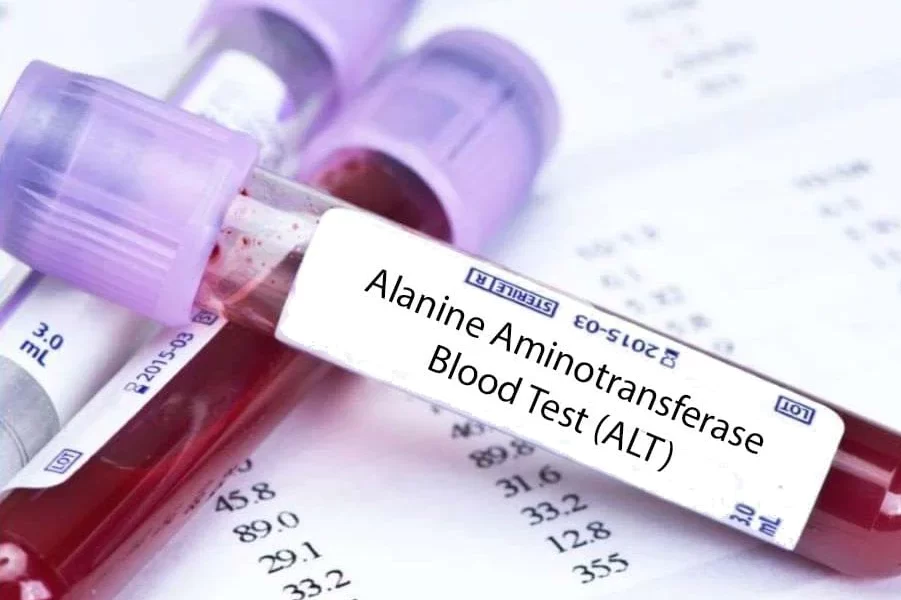What is the Alanine Transaminase, and what does the Alanine Transaminase (ALT) test measure?
Alanine Transaminase ALT for short and is also known as Serum Glutamic Pyruvic Transaminase (SGPT).
It is an enzyme mostly found in the liver, but the test measures the amount/concentration of this enzyme in the blood.
Some liver diseases cause high ALT levels before symptoms appear. ALT may be ordered by your clinician as a routine checkup or if symptoms of liver damage exist to screen, monitor, or diagnose liver disease.
Results may differentiate damage from acute (sudden) liver problems and chronic (long-term) liver problems.
The amount or concentration in the blood does not tell you the extent of liver damage.
Are there any interfering supplements that could alter ALT results?
Yes, there are, and these interfering substances can either increase ALT when taken in excess or may be due to genetic predisposition to liver damage following the consumption of certain supplements. These interfering substances can either interfere with the test method or interfere with the body. When it interferes with the test, it is a false result and has no clinical implication if the interferant is known and removed, but when it interferes with your body, it has a clinical implication and can be detrimental if left unaddressed.
Prescription medications that could interfere with ALT:
Prescription medications that may increase ALT levels include:
acarbose,
ACE inhibitors,
acetaminophen (toxic),
acetylsalicylic acid,
allopurinol,
amoxicillin,
amiodarone,
ampicillin,
amitriptyline,
asparaginase,
azathioprine,
β-blockers,
baclofen,
bupropion,
carbamazepine,
cephalosporins,
chloramphenicol,
chlordiazepoxide,
chlorpromazine,
chlorpropamide,
clindamycin,
cloxacillin, danazol,
desipramine,
dicumarol,
doxepin,
enflurane,
erythromycin,
estrogens,
ethambutol,
ethionamide,
ethyl alcohol,
fibrates,
gentamicin,
imipramine,
isoniazid,
ketoconazole,
low-molecular-weight heparin,
methyl dopa,
metaxalone,
methotrexate,
nafcillin,
nalidixic acid, oral contraceptives,
oxacillin,
phenobarbital,
phenytoin,
probenecid,
procainamide,
propoxyphene,
pyrazinamide,
quinidine,
rifampin,
risperidone,
sulfonamides,
terbinafine,
tetracyclines,
trazadone,
trimethoprim,
valproic acid,
verapamil,
zidovudine
Over-the-counter medications (OTC) that interfere with ALT:
OTC medications that may increase ALT levels include
Tylenol (acetaminophen),
Aspirin,
Ibuprofen,
Naproxen
Test method-related interferences for ALT:
Hemolyzed blood samples may cause falsely elevated results.
Are there any lifestyle-related activities that can interfere with ALT results?
coffee,
alcohol,
smoking
body-building supplements,
OTC weight loss supplements,
green tea extract in high doses,
Kratom, black cohosh,
Chinese herbs,
Korean herbs,
niacin,
immune support,
joint support,
weight loss products multi-ingredient nutritional supplements,
herbs for sexual performance,
Intense exercise or extreme exercise can cause a temporary increase.
Levels may increase or decrease during the menstrual cycle
What do you say to your primary care physician (PCP)?
Tell your PCP all the OTC meds, prescription meds, and/or herbs you are taking. Especially if you see more than one clinician because drugs prescribed by another clinician can have drug-drug interactions. Also, if your clinician is unaware of your smoking or alcohol habits, be sure to let your PCP know in order to optimize your healthcare and treatment.


